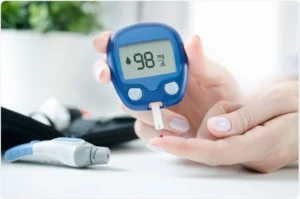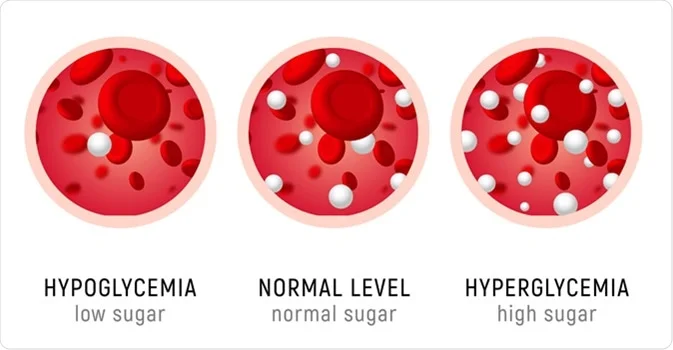Hyperglycemia is a common condition often associated with diabetes, but it can affect anyone. It’s vital to manage hyperglycemia effectively to prevent complications and maintain overall health. This blog aims to provide practical and safe approaches to hyperglycemia treatment at home. From understanding the basics of hyperglycemia to incorporating lifestyle changes and home remedies, we will guide you through various strategies that can help in controlling your blood sugar levels.
Contents
What Are The Best Hyperglycemia Treatment At Home?
 Treating hyperglycemia, or high blood sugar, at home involves a combination of lifestyle changes, monitoring, and possibly medication. It’s crucial to remember that these home treatments should complement, not replace, professional medical advice, especially for individuals with diabetes or other health conditions. Here are some of the best strategies for hyperglycemia treatment at home:
Treating hyperglycemia, or high blood sugar, at home involves a combination of lifestyle changes, monitoring, and possibly medication. It’s crucial to remember that these home treatments should complement, not replace, professional medical advice, especially for individuals with diabetes or other health conditions. Here are some of the best strategies for hyperglycemia treatment at home:
Regular Blood Sugar Monitoring
Keeping track of your blood glucose levels is a cornerstone of managing hyperglycemia. Regular monitoring allows you to understand how your body responds to different foods, activities, and stress. This information is critical in making informed decisions about diet, exercise, and medication. Most people use a home glucose monitor for this purpose. Keeping a log of your readings can also help your healthcare provider make better-informed decisions about your treatment plan.
Regular Physical Activity
Regular exercise plays a significant role in managing blood sugar. Physical activity helps the body use insulin more efficiently and can lower blood glucose levels. Activities like brisk walking, cycling, swimming, or yoga are excellent options. It’s important to start slowly and gradually increase the intensity and duration of workouts, especially if you are not used to regular exercise. Always consult with a healthcare provider before starting any new exercise program, particularly if you have existing health conditions.
Medication Adherence
If you have been prescribed medication for hyperglycemia, it’s crucial to take it exactly as directed. Medications play a vital role in managing blood sugar levels, and skipping doses or changing the dosage without consulting a doctor can lead to uncontrolled blood sugar levels. Regularly communicating with your healthcare provider about your medication’s effectiveness and any side effects is also important.
Weight Management
Maintaining a healthy weight is an effective way to control blood sugar levels. If you’re overweight, even a small amount of weight loss can significantly impact your blood sugar control. A combination of a balanced diet and regular physical activity is the best approach to losing weight and keeping it off.
Stress Management
Stress can cause blood sugar levels to rise. Therefore, managing stress is an important part of controlling hyperglycemia. Techniques such as deep breathing, meditation, yoga, or engaging in hobbies and activities that you enjoy can be effective stress relievers. Also, getting adequate rest and ensuring you have a good work-life balance can help manage stress levels.
Adequate Sleep
Sleep plays a critical role in maintaining good health, including blood sugar control. Lack of sleep can affect the body’s ability to regulate blood sugar effectively. Adults should aim for 7-8 hours of quality sleep per night. Establishing a regular sleep schedule and creating a comfortable sleep environment can aid in achieving better sleep quality.
Avoiding Tobacco and Limiting Alcohol
Smoking and excessive alcohol consumption can exacerbate blood sugar control problems. Tobacco use in particular is harmful as it increases insulin resistance. If you smoke, seeking help to quit can be beneficial for your overall health. If you choose to consume alcohol, do so in moderation and always with food to prevent low blood sugar levels.
Education and Support
Learning as much as you can about hyperglycemia and its management empowers you to take control of your health. Support groups for people with diabetes or high blood sugar can also provide valuable information, emotional support, and coping strategies. Many communities and online platforms offer resources for people living with hyperglycemia.
Implementing these strategies requires commitment and consistency, but they can significantly improve the management of hyperglycemia and overall quality of life. Always consult with healthcare professionals for personalized advice before making any significant changes to your lifestyle or treatment plan.
What Foods Are Good For Hyperglycemia?
 Managing hyperglycemia involves making informed choices about your diet. Certain foods can help stabilize blood sugar levels and should be included in your meals. Here is a list of foods that are generally considered good for managing hyperglycemia:
Managing hyperglycemia involves making informed choices about your diet. Certain foods can help stabilize blood sugar levels and should be included in your meals. Here is a list of foods that are generally considered good for managing hyperglycemia:
- Whole Grains: Foods like brown rice, quinoa, oatmeal, barley, and whole wheat are better for blood sugar control compared to refined grains. They contain more fiber, which slows the absorption of glucose into the bloodstream.
- Fiber-Rich Fruits and Vegetables: Non-starchy vegetables like broccoli, spinach, carrots, and peppers are great choices. For fruits, those with a lower glycemic index, such as berries, apples, pears, and oranges, are preferable. They provide essential nutrients and fiber without causing a significant spike in blood sugar.
- Legumes: Beans, lentils, and chickpeas are high in fiber and protein. This can help regulate blood sugar levels. They are also a good meat alternative for people looking to reduce their intake of animal protein.
- Lean Proteins: Incorporate lean protein sources like chicken, turkey, fish, eggs, and tofu into your diet. These foods have minimal impact on blood sugar levels and can help with satiety.
- Nuts and Seeds: Almonds, walnuts, flaxseeds, chia seeds, and other nuts and seeds are good sources of healthy fats, proteins, and fibers. They have a low glycemic index and can help in blood sugar control.
- Dairy or Dairy Alternatives: Choose low-fat or fat-free dairy products like milk, yogurt, and cheese. If you prefer dairy alternatives, opt for unsweetened almond milk, soy milk, or other plant-based options.
- Water and Low-Calorie Beverages: Staying hydrated is important. Water, herbal teas, and other calorie-free or low-calorie drinks are good choices. Avoid sugary drinks like sodas, fruit juices, and energy drinks as they can cause rapid spikes in blood sugar.
It’s important to remember that individual responses to foods can vary. Portion control and monitoring how different foods affect your blood sugar levels are crucial aspects of managing hyperglycemia.
Risks Of Hyperglycemia Treatment At Home
 Treating hyperglycemia at home is essential for managing diabetes and preventing long-term complications. However, it’s important to be aware of the potential risks associated with home treatment and to take steps to minimize them. Here are some of the key risks:
Treating hyperglycemia at home is essential for managing diabetes and preventing long-term complications. However, it’s important to be aware of the potential risks associated with home treatment and to take steps to minimize them. Here are some of the key risks:
- Overcorrection of Blood Sugar
There’s a risk of overcorrecting high blood sugar levels, leading to hypoglycemia (low blood sugar). This can occur if too much insulin or other glucose-lowering medications are taken, or if physical activity is not balanced with carbohydrate intake.
- Inadequate Response to Symptoms
Failing to recognize or properly respond to the symptoms of hyperglycemia can lead to dangerously high blood sugar levels. This can result in diabetic ketoacidosis (DKA) or hyperosmolar hyperglycemic state (HHS), both of which are medical emergencies.
- Dietary Mismanagement
Incorrect dietary choices can exacerbate hyperglycemia. For instance, consuming too many carbohydrates, not enough fiber, or meals with a high glycemic index can lead to spikes in blood sugar levels.
- Improper Medication Management
Incorrect dosing or timing of diabetes medications can lead to uncontrolled blood sugar levels. Additionally, using expired or improperly stored medications can reduce their effectiveness.
- Lack of Medical Supervision
Treating hyperglycemia without adequate medical supervision can lead to complications. Regular check-ups with a healthcare provider are essential to adjust treatment plans as needed.
- Physical Activity Risks
While exercise is beneficial for blood sugar control, it must be done correctly. For some individuals, especially those with heart disease or other complications, intense exercise without prior medical evaluation can be risky.
- Neglecting Comorbid Conditions
People with diabetes often have other conditions like hypertension or dyslipidemia. Focusing solely on blood sugar control while neglecting these can increase the risk of complications.
- Delayed Medical Care for Emergencies
Sometimes, symptoms that seem related to diabetes may signal other medical issues. Treating these at home without consulting a healthcare provider can delay necessary medical intervention.
To mitigate these risks, it’s important to have regular medical check-ups, follow a healthcare provider’s guidance closely, and educate oneself about the proper management of diabetes and hyperglycemia. It’s also beneficial to have a support system, either through family, friends, or support groups, to help navigate the challenges of managing diabetes at home.
Conclusion
In conclusion, hyperglycemia treatment at home involves a careful balance of regular blood sugar monitoring, maintaining a well-planned diet, engaging in physical activity, adhering to medication routines, and making overall healthy lifestyle choices. While these strategies play a crucial role in controlling blood sugar levels, it’s important to remember that individual needs vary and what works for one person may not work for another.
Regular consultations with healthcare professionals are essential to tailor a management plan that’s right for you. Ultimately, ensuring both safety and effectiveness. Do you want to get rid of diabetes? Join our online diabetes treatment program and reverse Diabetes naturally through lifestyle changes such as a Personalized Diet plan, Exercise, Yoga, dieticians, and health coaches.

